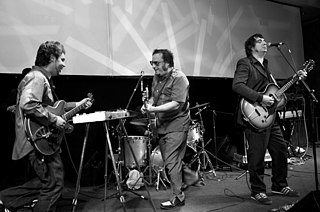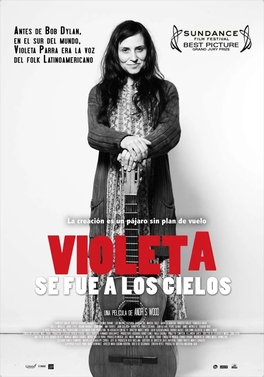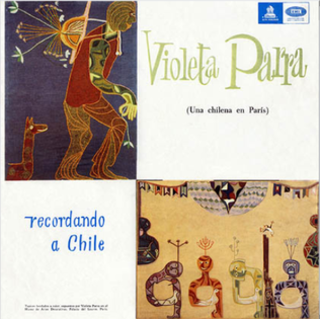
Los Tres also known as The Tr3s or The 3, is a Chilean rock band. Los Tres recorded nine albums from 1989 until 2000, starting with Los Tres in 1991. The band dissolved in 2000 and its members continued their musical careers. In February 2006 Alvaro Henríquez, Ángel Parra, and Roberto Lindl announced the reunion of the band without drummer Francisco Molina and the recording of their 2006 studio album Hágalo Usted Mismo.

Violeta del Carmen Parra Sandoval was a Chilean composer, singer-songwriter, folklorist, ethnomusicologist and visual artist. She pioneered the Nueva Canción Chilena, a renewal and a reinvention of Chilean folk music that would extend its sphere of influence outside Chile. Parra is acknowledged as "the Mother of Latin American folk".

Los Incas, also known as Urubamba, are an Andean folk music group formed in Paris in 1956. Argentinian musician Jorge Milchberg is credited as the founder of Los Incas.

Gracias a la Vida, or Here's to Life: Joan Baez sings in Spanish is a 1974 studio album released by American singer-songwriter Joan Baez. It was performed mainly in the Spanish language. Baez stated at the time that she released the album as a "message of hope to the Chileans suffering under Augusto Pinochet", in the wake of the death of Salvador Allende.. Songs include selections by Chilean composers Victor Jara and Violeta Parra, who composed the title song.

Violeta Isabel Cereceda Parra, better known as Isabel Parra, is a famous Chilean singer-songwriter and interpreter of Latin American musical folklore.
Rafael Manríquez was a Chilean journalist, singer, guitarist, composer and producer born in Santiago.

Camila Moreno is a Chilean rock and folk singer-songwriter.
"Gracias a la vida" is a song composed and first performed by Chilean musician Violeta Parra, one of the artists who set the basis for the movement known as Nueva Canción. Parra composed "Gracias a la vida" in La Paz in 1966, and the song was released on Las Últimas Composiciones, the last album Parra published before committing suicide in 1967. The song is one of Parra's most renowned and is performed throughout the world, and remains as one of the most covered Latin American songs in history. The song was inducted into the Latin Grammy Hall of Fame in 2013.

Violeta Went to Heaven is a 2011 Chilean biopic about singer and folklorist Violeta Parra, directed by Andrés Wood. The film is based on a biography by Ángel Parra, Violeta's son with Luis Cereceda Arenas. He collaborated on the film.
Guillermo "Willy" Alfonso Bascuñán Dockendorff, is a Chilean composer and actor. He is the only composer who has obtained both the first place in the folkloric and international competitions in the same edition of the Viña del Mar International Song Festival.

Canto y guitarra, also known as El folklore de Chile, is an album by Violeta Parra released on the Odeón label in September 1957. It was the first full-length album by Parra. It was released after Parra's return from Europe where she traveled for two years.

El folklore de Chile Volumen 2, also known as Acompañándose en guitarra, is an album by Violeta Parra released on the Odeón label in 1958. It was the second full-length album by Parra. The album features Parra singing and accompanying herself on guitar. The album contains 16 songs, including songs collected in the countryside and original compositions.

La cueca presentada por Violeta Parra, also known as El folklore de Chile Volumen 3, is an album by Violeta Parra released on the Odeón label in early 1959. It was the third full-length album by Parra and part of Odeón's "El folclore de Chile" series to which Parra contributed five albums. The album contains 24 songs in the cueca genre. The cueca is the Chilean national dance, and the songs were collected between November 1957 and January 1958 in the central region of Chile between Santiago and Concepción. The sole original composition is "Cueca larga de Los Meneses" which was written by Parra and her brother, the "anti-poet" Nicanor Parra.

Toda Violeta Parra: El folklore de Chile Vol. VIII is an album by Violeta Parra released on the Odeón label in late 1961. It was the fifth full-length album by Parra and part of Odeón's "El folclore de Chile" series to which Parra contributed five albums. The album contains 14 songs collecting Parra's work as a folk songwriter at different stages of her career. The album was Parra's first to explore issues of social justice and includes three tracks in which she set to music poems of Nicanor Parra and Pablo Neruda.

Chants et Danses du Chili I is an extended play record by Violeta Parra released on the Le Chant du Monde label in September 1956. It was the Parra's first extended play record. The release contains eight songs recorded in Paris on March 26, 1956. Parra toured Europe in 1955 after winning the Caupolicán prize in 1954.

El folklore de Chile según Violeta Parra,, also known as Violeta Parra en Argentina, is an album by Violeta Parra released on the Odeón label in June or July 1962. It was recorded at the Odeón studios in Buenos Aires between April 23 and May 4, 1962. Parra lived in Argentina from the spring of 1961 until the fall of 1962. The album contains 14 songs, including traditional Chilean folk songs and original compositions by Parra.

Recordando a Chile, also known as Una Chilena en París, is an album from Violeta Parra released on the EMI Odeón label (LDC-36533) in the summer of 1965. It was recorded during Parra's stay in Santiago between August 14 and October 21, 1964, and after her return from Europe in approximately August 1965. Tracks 2, 3, 5, 6, 10, and 11 were recorded in stereo and are believed to be from the 1965 sessions. The album cover features artwork by Violeta Parra.

"La Jardinera" is a song in the tonada genre written and performed by Violeta Parra. The song was originally recorded by the Hermanas Parra and released on the Odeón label.

"Que Pena Siente el Alma" is a song written and performed by Violeta Parra released on the Odeón label (E-50040) in 1955.
"Volver a los Diecisiete" is a song written and performed by Violeta Parra. It was composed in 1962 but was not released until 1966 on her final album, "Las últimas composiciones".
















